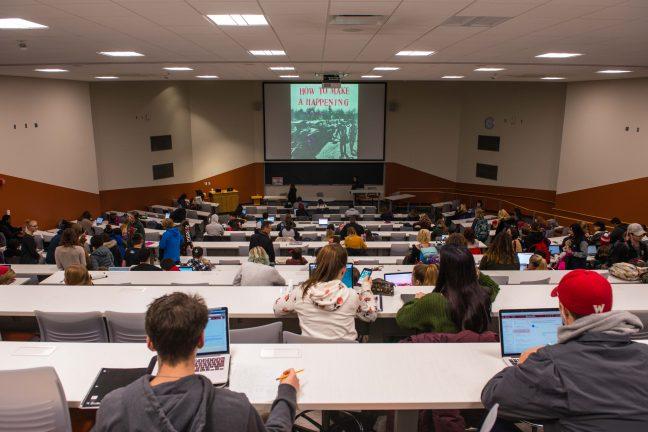Wednesday, Sept. 19 was a normal day. Despite the gray skies and pouring rain, students filed toward their classes, distracted by deadlines and the fast-approaching midterm season. It was less than two weeks into the semester; everyone was, in more ways than one, still getting the hang of things.
That very same Wednesday, if one wasn’t watching carefully, they might not have noticed the absence of Jewish students from classes and discussions. But for those who observed Yom Kippur, the holiest day in the Jewish year, Sept. 19 posed a two-fold challenge: first, how does one deal with an absence so early in the semester? That, combined with staying on top of homework during a 25-hour period of fasting, reflection and prayer is a struggle Jewish students know all too well.
The obvious answer — and one received by many observant students — is simply to plan ahead. The University of Wisconsin’s absence policy asks students to notify professors of a potential religious observance conflict no less than two weeks into the semester. Professors are also requested not to schedule “mandatory academic requirements” on days during which a large portion of students might be observing a religious event.
And yet, in all its specifications, UW’s religious absence policies offer a convenient option for students to miss class, makeup exams, but not much else. As every overworked, stressed-out student can tell you, getting permission to skip lecture isn’t the same thing as making up lecture. More often than not, attending lecture on a holiday is easier than trying to get notes, attending office hours and piecing together the lesson on your own, painstakingly, in the few hours before class.
For some Jews on Yom Kippur, spending Wednesday doing homework and catching up on lectures in time for Thursday can be impossible. Fasting and prayer services take up the majority of the day. At sunset, there are a scant few hours after breaking the fast to prepare for the next day. Asking for another day off from classes would only multiply the work left to complete.
UW’s academic year, like many of the calendars in the U.S., is geared towards Christian holidays. Semesters are split by Christmas and New Years and exams are carefully scheduled to end with enough time for students to return home by Dec. 25.
Amid divisions, disparities, students work to facilitate interfaith dialogues on campus
It would be inconceivable to ask Christian students to make up work on Christmas, yet, last May, Muslim students at UW and around the world celebrated Ramadan during final exams. In January, Hindu students were denied their request to make Diwali a school holiday in Coppell, Texas, despite accommodations for holidays such as Good Friday in the school calendar. Almost two years ago, the controversial Associated Students of Madison divestment resolution regarding Israel was discussed by ASM during the holiday of Passover, when many Jewish students returned home to celebrate with their families.
When accommodations for religious observances are made, students from non-Christian religions still, despite guidance on measures of flexibility, bear the brunt of the absence. Muslim and Jewish students might have to navigate homework and make-up exams around fasting schedules and specific prayer times; Hindu students might find themselves trying to justify all five days of Diwali’s observance to a professor who might not know how to approach that kind of absence beyond what is outlined in university policy.
At its core, the religious absence policy ignores one key issue: accommodation is not the same thing as never missing class in the first place. Accommodation is not flexible. It is, at best, a permission to miss class. At worst, it forces students to seriously weigh their personal faith against their education.
Madison-area faith leaders, social justice activists discuss place of religion in law
Holidays differ widely across the religious spectrum, just as much as those who observe them and the methods they choose to do so. One Jewish student may take off multiple days for Sukkot, less than a week after Yom Kippur. Another might have attended all of their classes anyway. Neither is wrong nor a model for Jewish students as a whole.
By asking students to clearly dictate their religious observances well in advance, and promise to catch up on their own — religious — time, current policy ignores the privilege of Christian students who never needed to utilize this system in the first place. It assumes that non-Christian holidays are inconveniences to the educational calendar, instead of seasonal, diverse events held very dear by thousands of different students.
By providing more than just an absence excuse for students observing religious events, UW has the potential to further education and tolerance toward non-Christian and non-Abrahamic religions. Professors should work closely with students on a case-by-case basis, and remain flexible when an absence — or even several — aren’t enough to be caught up. In return, students should be given opportunities to catch up and makeup assignments that don’t occur during their holidays.
Most importantly, students should be given the opportunity to fully celebrate their holiday or observance, wherever it happens to fall on the calendar. Religion — dynamic, interpretive and individual in so many ways — is not an inconvenience. For every student at UW, it never should be.
Julia Brunson ([email protected]) is a senior majoring in history.














